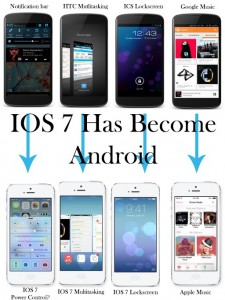Is being innovative not that necessary anymore in this current electronic market? If we talk about current consumer’s behaviour, innovation does not seem to be the sole interest that determine purchases anymore. Look for example, the Apple iPhones. Apple finally launched its “innovative” iPhone 5S and 5C which have been sold out everywhere. Not much has changed, except few design specifications. But how come every ‘updated’ products they launched sold out their first batch in just few hours?
Compare iOS7 to Android; features, layout and what not. Yet consumers still prefer iPhone over Android, despite the cheaper prices and earlier innovations. I personally think that how the company promotes themselves as is more crucial. Apple has youthful, trendy and innovative brand image that boosts consumers’ self-esteem, allowing them to charge higher prices. Even though no significant differences with other products, I think Apple has successfully make customers to be satisfied with the brand, not the product itself. Apple promotes lifestyle, not product.
What I’m saying is that concentration on R&D must not outweigh marketing. Companies like Apple build customer relationship, realizing that manipulating consumers’ behaviour is more effective into luring them to purchase rather than always coming up with new things that innovation may not seem that exciting anymore. Building customer loyalty through brand image establishment is more effective people are psychologically ‘forced’ to ‘need’ the product, not just wanting it.


